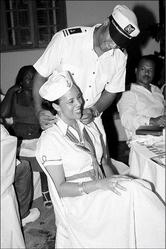
Stephen Ueker places a necklace he had just bought at an auction at the Rotary Club of Montego Bay installation ceremony, at Doctors Cave Club on Saturday, around the neck of his fiancée Ann Chen. - Photo by Richard Morais
This is another installment from the soon-to-be published book on parenting, by Dr Faith Linton and Dr Barry Davidson.
Here is an exercise which you may find helpful as you look back at your childhood and try to assess your experience with your parents.
Imagine you are watching a videotape giving the story of your life. The video starts from the time you were in your mother's womb and ends when you were ready to leave home and live on your own. Follow the video, stage by stage, and relive your experiences from conception to adulthood.
As you are doing this, stop from time to time and talk about your life-story with a close friend, a family member or a trusted mentor/counsellor. To guide you, here are some statements which describe various kinds of parenting situations and circumstances. Read them, then make up your own statements describing your particular life experience. Draw on the information you may have heard from family members, or the memories which come to mind as you think and talk about your life.
The following statements deal with four stages in a child's life - in the womb; the early months and years; pre-teen, Six to 11 years; and teenage years.
These statements come under the headings relationship and firmness, which we have already discussed.



Linton, Davidson
In the womb
Relationship
(a) My mother was glad to be pregnant.
(b) My mother felt anxious and upset during the pregnancy.
(c) My mother wanted to abort me.
(d) My father and siblings looked forward to my birth. They talked to me, sang and prayed for me while I was in the womb.
Firmness
(a) During pregnancy my mother attended the health clinic regularly.
(b) My mother tried to eat right and to get enough rest and exercise for her own good and for the sake of the unborn child.
(c) My mother and father smoked and drank alcohol not knowing this could harm the child in the womb.
(d) My father and mother believed that a pregnant woman should try not to get angry or be sad but should think good and pleasant thoughts and spend her time in useful, wholesome activities.
The early months and years
Relationship
(a) My mother stayed at home with me for the first few weeks/months, for the first year/years of my life.
(c) My mother breast-fed me for - weeks/months.
(d) My mother liked looking after her babies.
(e) My mother had to go back to work when I was - months old.
(f) My grandmother was glad to take care of me when my mother was at work.
(g) My father was proud of me and enjoyed holding me and playing with me. So did other members of the family.
(h) After I was a few months old, I spent weekdays in a daycare centre until I was old enough to go to nursery school.
(i) In the first year of my life, I moved from one home to another and had about three different mother figures, one after the other.
Firmness
(a) My mother took me to the health clinic regularly and followed the advice of the nurse/doctor about taking care of me.
(b) Even after I started walking, I still ate nothing but porridge, bread and little packets of cheese snacks when I felt hungry.
(c) I was a very active and inquisitive child, so I got a lot of spanking.
(d) My mother hated to hear me cry so she gave me everything I wanted.
(e) Before I was three years old I learnt to say please, thank you and sorry, to give God thanks before eating, and to leave my shoes at the doorway before entering the house.
- Next week - Pre-teens: six-11 years

